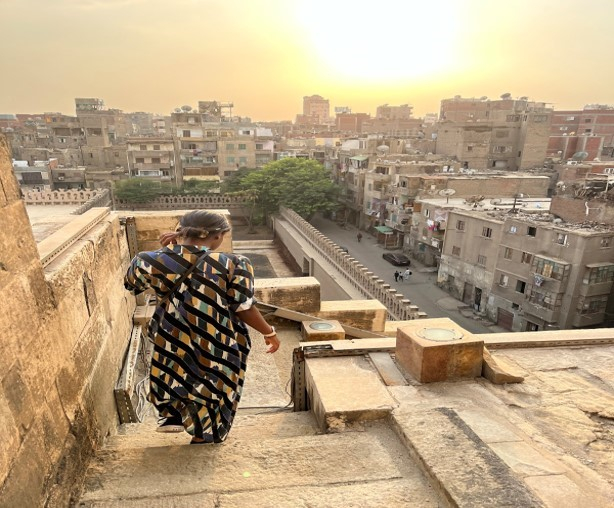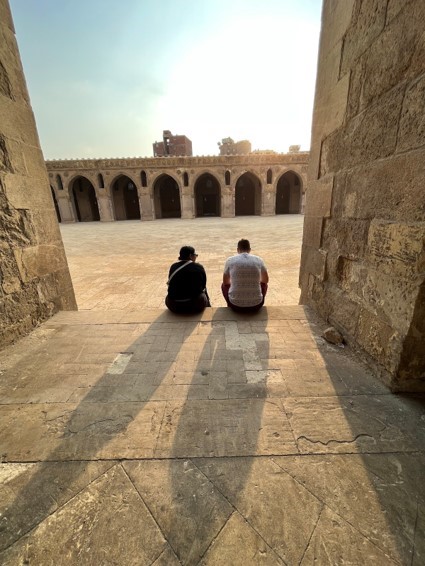Are AUP Cultural Trips Right For You?

I took a screenshot of the itinerary I received from the Cultural Program Office and sent a Snapchat to my little sister, captioned “I’M GOING TO EGYPT.” Fall break had finally arrived, and the fatigue of my first semester of graduate studies had set in. I was more than excited for the opportunity to learn about the civilization responsible for the first forms of written communication. Although the trip to Cairo was quite an investment, I looked forward to it. My experience gave me many tips and tricks for you to consider before taking the leap and signing up to explore the world with AUP.
My Cairo travel group was a mixture of undergraduate and graduate students. Some students were in the attached courses, and others were just interested in learning about Egypt's culture. The combination of students created an interesting dynamic. Though the AUP student is painted as a global citizen, some students are still tackling the definition of that term. The trip included aggravating comments from students labeling the developing nation as third world, ghetto, and gross, to list a few words overheard on the trip. Being from a developing nation, I was offended by the insensitive and childish remarks made by fellow AUP students. I found that the maturity level of some of the students was to blame. I had the opportunity to interview the Cairo trip leader, Professor Tresilian. A professor of contemporary literature, Professor Tresilian taught one of the courses linked to the Cairo trip and was the trip leader and organizer. When I asked him if he believed the level of maturity of some students took away from the learning outcome or enjoyment of the journey, he said he did not believe so. He had previously led the trip in the spring of 2020, just before the COVID-19 outbreak, and thought his students in the Modern to Contemporary in the Arab World class could benefit from the trip. Professor Tresilian enjoys returning to Cairo, where he once worked for several years, to see the ever-changing city. I found it fascinating to learn about the city, the culture, and the changes from his point of view.
However, I have to disagree with Professor Tresilian and believe that some of the student's maturity levels detracted from the study trip. He credited some of the undergraduate students with bravery for taking on such a big adventure during their first semester in a foreign country. Though I agree with this, some students' lack of cultural and self-awareness created an embarrassing dynamic of imperialism. I gritted my teeth and held back words as a fellow student entered a historic mosque and a monument of Islam in the region in cutoff shorts and refused to wear the provided coverup. I believe that it is necessary for trip leaders and the Cultural Programs Office to educate students before embarking on study trips. Not providing a more detailed guide for students before travel was a missed opportunity to teach. There seemed to be an assumption that students on the trip had experienced traveling aside from their travels from the U.S. to Paris, which was not the case for everyone. Therefore, it is essential for students and those in charge of the program trips to better inform traveling students about their travel destination. Students should also bear in mind that study trips are not vacations.
Study trips are an investment. Before investing time and money into these optional study trips, students should take a moment to consider a few factors including the place they are traveling to and the experience they are seeking. According to the Cultural Programs Office, study trips are planned in conjunction with AUP professors and faculty, academic affairs, and the Cultural Programs Office. The tedious planning process has many elements: the length of the trip, the time of semester the trip will take place, the course or courses linked to the trip, and the two leaders assigned to every trip.
Another factor the Programs Office considers carefully is the affordability of the study trip. Professors and faculty working together volunteer to plan these trips and want to make them accessible to all students. Study trips are open to all AUP students; however, students enrolled in the courses associated with the trip will receive priority when spaces become limited. In addition to priority enrollment, students in classes connected to the trip can apply for Coup De Pouce. This essay-based award subsidizes the cost of the trip. A common complaint about this program is the reward amount, and students have complained that more than the invested amount is needed to cover the cost of the trip plus expenses once on the study trip. It's important to point out that some study trips are mandatory for students pursuing the MAGC Development Communications track to complete one of the core course requirements.
The study trip costs cover hotel, transport, breakfast, and at least one non-breakfast meal covered by AUP, depending on the length of the trip and excursions on the planned itinerary. Depending on the journey's region, all meals are scheduled by AUP, but the students cover the costs. Professor Tresilian said, “It was important on the Egypt trip for the meals to be planned to ensure that the restaurants were suitable and could accommodate our large group.” The planned restaurants and guided menu selections ensured students did not become ill, and none of the meals were disappointing. However, a common complaint on my journey to Egypt was the clarity about which meals were or were not covered by AUP. Paying separate checks should be straightforward, but it was often a moment of contention. Adding to the contentious task was the access to cash machines to withdraw currency to pay for meals at establishments that did not accept card payments. An essential factor to consider when traveling abroad, which a seasoned traveler would find self-explanatory, is the possibility of credit/debit cards failing. Even though this is a stressful scenario, a certain level of adaptability is required for study trips. Although study trips are not vacations, they can be fun if you can quickly adapt to stressful situations.
Image Credit: Dwyette TurnquestAt the same time, It is essential not to compromise your emotional well-being for the sake of a study trip, and I would suggest you speak to trip leaders if you find yourself in compromising positions while on the trip or deciding to participate in the excursion. However, I must reiterate that before deciding on a study trip, consider a few things: what would you like to accomplish on the study trip? If you want to learn outside of a classroom, I highly recommend study trips. Although, if you are interested in stopping at every souvenir stand, a short cultural trip is more your speed. Additionally, when selecting study trips, consult your AUP academic calendar and ensure it does not conflict with significant events like midterm exams and finals. The stress of exams can take away from the trip experience. Another helpful tip before travel is promptly handling housekeeping in preparation for travel: remember to provide passport information promptly and read all emails linked to your study trip to avoid delays in travel preparation. In addition, at the end of the study trips, participants receive an experience survey. Though I have not received a survey linked to my study trip, the Programs Office, faculty, and staff appreciate your feedback via the survey. This survey helps improve study trips for the next semester.
Moreover, students need to know what to pack and not to pack when traveling. On the list of don'ts: don’t pack your AUP privilege. After my trip to Egypt, I was unsure if I would ever embark on another study trip due to the blatant disregard for other cultures I encountered from fellow AUP students. While my study trip could have been better, I enjoyed my experience. I bonded with my fellow graduate students over sleeper trains, and stomach bugs, and experienced a new culture. The experience could have been different if students had similar objectives and preparedness before travel. Students and the program office must work together before travel to ensure a safe, respectful, and enjoyable experience when immersing in another culture.








